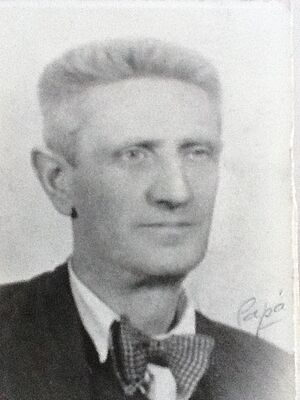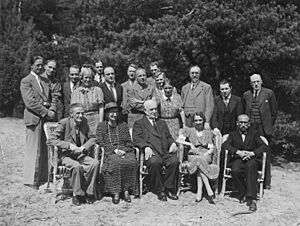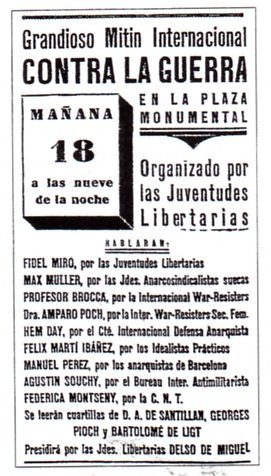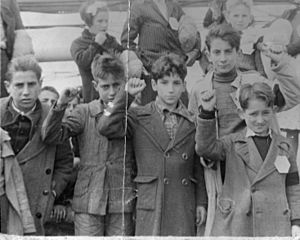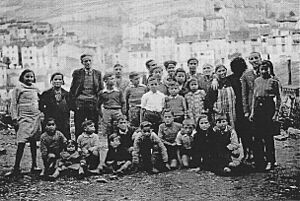José Brocca facts for kids
José Brocca (born in 1891, died in 1950) was a special kind of hero during the Spanish Civil War. He was a pacifist, which means he believed in solving problems without fighting or violence. He was also a humanitarian, meaning he cared deeply about helping people. Brocca supported the Republicans in the war, but he always looked for peaceful ways to resist the Nationalist rebels.
José Brocca was born in Almería, Andalucia, Spain. His father was from Italy and worked there as the Italian Consul, like an ambassador for his country.
Contents
A Different Kind of Hero
Many people think the Spanish Civil War was just two big groups fighting: the Republicans versus the Nationalists. But it was much more complicated! There were many smaller groups and different ideas on both sides.
One important group that is often forgotten is the pacifists. These were people who worked for peace and non-violence, even during the war. José Brocca was a big part of this movement. He worked with an organization called War Resisters' International (WRI), which helped people who didn't want to fight. While many stories focus on soldiers and battles, Brocca's work shows that helping people and working for peace was also a brave and important part of the war.
Life in Viator
Like many families during the war, José Brocca's family faced a lot of change and separation. But his children always remembered their childhood in Viator, a small town near Almería. Brocca was a school director in Viator in the early 1930s. He was known as a respected leader in his community.
For example, he helped bring water to a public fountain in the village. This was a big deal because some local businesses didn't want it to happen. There was even a plaque at the fountain to remember this event, but it has since disappeared. Brocca also helped set up "Escuelas Laicas" (secular schools), which were schools not connected to the church. This idea later became part of the Republican government's plans.
Andalucia, where Viator is located, quickly became a violent place during the Civil War. One famous event was when the German navy shelled the port of Almería. The war was so difficult that sometimes even family members ended up on different sides.
José Brocca had five children: Arnulfo, Helio, Irma Leticia, Olga Teresa, and Humberto. Arnulfo, the oldest, joined the Nationalist side and became a high-ranking officer. Humberto joined the Republican side and sadly died from injuries and sickness he got during battles.
Even with the horrors of war, the four surviving brothers and sisters remembered their childhood in Viator fondly. They stayed in touch after the war. Arnulfo, who was a decorated war hero, always said his pacifist father was "the greatest man who ever lived." This shows how strong family bonds can be, even when people have very different beliefs.
Brocca supported the socialist ideas in Spain. He also represented Spanish pacifists at international peace meetings. He worked with Amparo Poch y Gascón, a doctor and feminist who also believed in peace. Brocca felt that pacifists had to support the Republican cause, but his main goal was always to help people. There's a local story that he even helped a Catholic priest escape danger by giving him his car.
From 1933 to 1937, Professor Brocca worked in Madrid as a school inspector and university teacher, while his family stayed in Viator. He is also believed to have spent some time in Buenos Aires, Argentina, where his brother lived.
A Challenge for Pacifists
The Spanish Civil War was very hard for many pacifists in Europe and the USA. Some, like the famous scientist Albert Einstein, even stopped being pacifists because of Hitler's rise to power.
José Brocca believed that in Spain, people had no choice but to fight back against violence. He said that the people who started the war were responsible for the suffering, because they were fighting to keep old, unfair privileges, not for good ideas.
Brocca's actions in Spain were seen as a good example by pacifists in other countries. Herbert Runham Brown, a leader of the WRI, shared a letter from Brocca. In it, Brocca explained how he was helping:
- He encouraged farmers to keep working their land, even in areas left by the fascists, to make sure towns had food.
- He helped set up schools and homes for children whose parents had died or were fighting.
- He tried to spread ideas of peace and kindness among the soldiers.
Brocca even left his government job in Madrid to focus on helping people. He organized buying and giving out food and clothes, which came through a dock in Valencia paid for by the WRI. In Madrid, he set up a women's committee to give out food and find people who couldn't get to help centers.
Helping War Children
During the war, the town of Prats-de-Mollo-la-Preste in France became a safe place. The War Resisters' International paid for a refuge there, which Professor Brocca and his wife ran. His children, Helio, Irma, and Olga, also stayed there for a while. Later, they were sent to live with kind families in Rouen, France. But when Germany took over France in World War II, they had to escape back to the south.
The Prats-de-Mollo refuge took in children separated from their families, orphans, and widows who had escaped from Spain. About forty people lived there at a time. Professor Brocca became very good at finding secret paths through the Pyrenees mountains. He crossed the border many times to help people. The refuge became like an "underground railroad" for those escaping danger.
Brocca didn't like traditional orphanages, which he thought felt like prisons. Before the war, he and Amparo Poch suggested a plan to the government for "homes" that would shelter about twenty-five children with a caring "surrogate" mother and father. Even though wartime made it hard, Brocca helped set up several children's colonies in southern France. With WRI's help, he also settled five hundred children in Mexico. Most of these children were from Republican families, but Brocca also helped orphans whose parents were Nationalists.
Escape and Exile
After the Civil War ended, Professor Brocca refused to leave Prats-de-Mollo until all the children in his care were safely back with their families in Spain. By this time, his own life was in great danger from the Nazis and their helpers in France.
Prats-de-Mollo was near one of the main border crossings used by hundreds of thousands of Spanish refugees. It was a very difficult journey through the mountains. Amparo Poch y Gascón also used this route and stayed at the refuge before reaching Toulouse, where she lived the rest of her life.
Because Prats-de-Mollo was also near a concentration camp set up by the Nazis, and because Brocca had been helping anti-war people escape Spain, his life was in even more danger. British pacifists offered him a safe place in the UK. However, before he could accept, he was arrested and put in prison.
Thanks to the WRI and the help of the French Resistance, Brocca escaped from the concentration camp. He left France and finally arrived in Mexico on October 17, 1942, on a ship called the SS Nyassa. For a long time, he and his wife didn't know if the other had survived. Later, his wife and one of his sons, Helio, joined him in Mexico. They settled in San Luis Potosí and Mexico City. Money for their travel was raised by supporters in the UK and USA. Brocca's other children settled in Wales (Olga), Sweden (Irma), and Spain (Arnulfo).
Professor Brocca never saw Spain again. He died suddenly in June 1950 at the age of 59 and is buried in Mexico City.
Hope for the Future
In the early 1970s, after Franco's death and Spain's move towards democracy, Brocca's widow, Rosa García López, was able to return to Spain. She lived with relatives in Madrid and with her sister in Vigo. Rosa also spent time with her daughter Olga Brocca Smith and her family in Wales. Olga and her husband were peace activists throughout their lives.
An American writer named Allan A. Hunter wrote about the Spanish Civil War and World War II. He saw hope in the work of humanitarians like José Brocca. Hunter said that Brocca understood that fighting fascism with violence only makes things worse. To stop bad ideas like fascism, we must prevent the desperation, poverty, and lack of education that help them grow.
Scott H. Bennett wrote about José Brocca: "Brocca's story shows that pacifist courage is just as heroic as military courage."
See also
- List of peace activists
- In Spanish: José Brocca para niños
 | Toni Morrison |
 | Barack Obama |
 | Martin Luther King Jr. |
 | Ralph Bunche |


